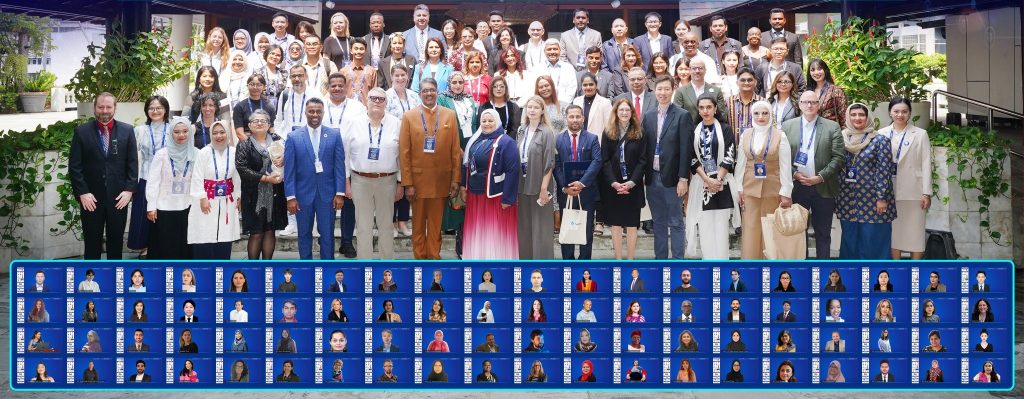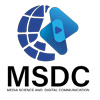Speakers
- Home
- Speakers
Keynote Speakers


Distinguished Professor Daya Thussu
Title: "Íntelligent 'Imperialism': Artificial or Real?"
President of the International Association for Media and Communication Research (IAMCR)
Hong Kong
Professor Daya Thussu is an internationally renowned scholar in the field of international communication. With an academic and professional career that spans decades and continents, Professor Thussu has made significant contributions to the understanding of global media flows, communication theory, and the political economy of media.
He currently serves as the President of the International Association for Media and Communication Research (IAMCR), the leading global body of media and communication scholars. He is Professor of International Communication at Hong Kong Baptist University. In his distinguished academic journey, he held the position of Visiting Professor and was the inaugural Disney Chair in Global Media at Schwarzman College, Tsinghua University, Beijing—an appointment that reflects his global standing and expertise in media studies.
For many years, Professor Thussu served as Professor of International Communication at the University of Westminster in London, where he also co-directed the India Media Centre. In addition, he contributed as a research advisor to the China Media Centre, enhancing cross-cultural and transnational perspectives in media research. His academic work has been shaped by a solid foundation in international relations, having earned his PhD from Jawaharlal Nehru University in New Delhi, one of India’s premier institutions.
Before transitioning into academia, Professor Thussu worked as a journalist in both India and the United Kingdom. His early career included roles at the Press Trust of India, the country’s national news agency, and as Associate Editor at the Gemini News Service, where he developed a nuanced understanding of global news production and dissemination.
A prolific scholar, Professor Thussu is the Founder and Managing Editor of Global Media and Communication, a peer-reviewed journal published by SAGE. His research output is extensive and influential, having authored or edited 20 books that have become foundational texts in media and communication studies. Notable works include:
- Electronic Empires: Global Media and Local Resistance (Arnold, 1998; edited)
<liInternational Communication: Continuity and Change (3rd ed., Bloomsbury Academic, 2019)
- Media on the Move: Global Flow and Contra-flow (Routledge, 2007; edited)
- News as Entertainment: The Rise of Global Infotainment (SAGE, 2007)
- Internationalizing Media Studies (Routledge, 2009; edited)
- Media and Terrorism: Global Perspectives (SAGE, 2012; co-edited with Des Freedman)
- Communicating India’s Soft Power: Buddha to Bollywood (Palgrave, 2013 / SAGE, 2016)
- Mapping BRICS Media (Routledge, 2015; co-edited with Kaarle Nordenstreng)
- China’s Media Go Global (Routledge, 2018; co-edited with Hugo de Burgh and Shi Anbin)
- Changing Geopolitics of Global Communication (Routledge, 2025)
Throughout his career, Professor Thussu has championed the need for a more inclusive and global approach to media and communication research. His scholarship has not only expanded academic understanding of media systems in the Global South but has also encouraged a critical examination of dominant paradigms in global communication. His work continues to inspire scholars and students worldwide, establishing him as a pioneering voice in the evolving landscape of international media studies.


Dr. Maxim Behar
Title: "The communications of tomorrow happens today. What's next?"
President of the World Communications Forum Association
Davos, Switzerland &
PRCA UK Fellow
Dr. Maxim Behar is a globally renowned PR expert, entrepreneur, journalist, diplomat, and Harvard Kennedy School graduate. He is a President of the World Communications Forum Association in Davos, Switzerland, the founder and CEO of the Bulgarian leading PR company M3 Communication Group, Inc., exclusive partner of Hill & Knowlton. Maxim is a former ICCO President, Chairman of the Board of Trustees of the University of National and World Economy in Sofia, the largest business University in South Europe. He is a Doctor of Modern Public Relations and Social Media from Sofia University.
He has been inducted into the Global PR Hall of Fame in London and awarded many titles, among them Best PR Professional in Europe for 2020 and 2022 by PR Week, Global CEO of the Year by The International Stevie Awards, and Communicator of the Decade by the Indian Association of Business Communications. His book The Global PR Revolution was ranked among the Top 3 Best PR Books of All Time by Book Authority. Maxim Behar is also a Honorary Consul General of Republic of Seychelles to Bulgaria.


Distinguished Prof. Jim Macnamara
Title: "Reconceptualizing and Rethinking Media and Communication to Rediscover and Reengage the Lost Public"
School of Communication ,
Faculty of Arts & Social Sciences at the University of Technlogy Sydney (UTS),
Australia
Jim Macnamara is a Distinguished Professor in the School of Communication within the Faculty of Arts & Social Sciences at the University of Technlogy Sydney (UTS). From November 2019 to February 2023 he served as Deputy Dean of the UTS Faculty of Science.
He is also a Visiting Professor at The London School of Economics and Political Science (LSE), Media and Communications Department, and a Visiting Professor at the London College of Communication (LCC) in the University of the Arts London (UAL).
Jim is internationally recognised for his research into evaluation of public communication including advertising, public relations, and marketing, corporate, and government communication to identify effectiveness and inform strategy, and his research into organisational listening has been described as “of major international significance”. He also has conducted extensive research into health communication, including for the Cancer Institute NSW, the NSW Department of Health, the NSW Multicultural Health Communication Service, and he has led global evaluation research for the World Health Organization (WHO) during the COVID-19 pandemic and for World Health Days between 2020 and 2022. He is Convenor of the Health Communication Research Group at UTS.
His research has had substantial industry, professional, and social impact, including adoption of his evaluation framework for communication by the NSW Government, the International Association for Measurement and Evaluation of Communication (AMEC), and the World Health Organization (WHO), and his recommendations on evaluation and organisational listening have been adopted by the UK Government Communication Service (GCS) in the Cabinet Office, Whitehall, and the European Commission Directorate-General for Communication (DG COMM).
In 2017 he was presented with The Pathfinder Award,”the highest academic honor” awarded by the Institute for Public Relations (IPR) in the USA for his scholarly research, and The Don Bartholomew Award for “outstanding service to the communications industry” by the London-based International Association for Measurement and Evaluation of Communication (AMEC).
Jim is the author of almost 100 academic journal articles and book chapters, a number of influential research reports, and 18 books including, most recently, ‘Public Communication and Public Policy’ (John Wiley & Sons, 2025), ‘Organizational Listening II: Expanding the Concept, Theory, and Practice (Peter Lang, New York, 2024), ‘Beyond Post-Communication: Challenging Disinformation, Deception, and Manipulation’ (Peter Lang, New York, 2020); and ‘Evaluating Public Communication: New Models, Standards, and Best Practice’ (Routledge, UK, 2018).


Prof. Lilie Chouliaraki
Title: "Weaponization of victimhood in the context of far-right political communication"
Chair in Media and Communications in the Department of Media and Communications
London School of Economics (LSE)
England
Professor Lilie Chouliaraki is Chair in Media and Communications in the Department of Media and Communications at LSE. She has a background in Languages and Linguistics, having completed her MA and PhD at Lancaster University Department of Linguistics, before which she studied for a bachelors degree at the School of Philosophy, University of Athens.
Her research has a strong interdisciplinary orientation, drawing on Social and Cultural Theory, Moral Philosophy and Sociology, Visual Communication and Social Semiotics as well as Discourse Theory and Analysis. Her main interest lies in understanding how the media shape our ethical and political relationship to vulnerable others in the global South but also in the global North; how claims to pain intersect with power relations to inform the ways we witness vulnerable others and the ways we are invited to feel, think and act towards them. Her empirical material has included disaster news, humanitarian and human rights communication, migration as well as war and conflict journalism, studying these in a historical perspective and across mass and digital media.More recently, Prof. Chouliaraki has turned her attention to histories of the victim and the politics of victimhood in the context of emotional capitalism, social media platforms and far-right populism. Her book on the topic, Wronged. The Weaponization of Victimhood was published with Columbia University Press in 2024.
Professor Chouliaraki has served at a number of LSE Committees and has sat at the Board of the Marshall Institute for Philanthropy and Social Entrepreneurship and LSE’s Women, Peace and Security Centre. She has also been a Member of the AHRC Peer Review College. She is also Honorary Professor at the Copenhagen Business School and has been visiting Professor at a number of universities including CELSA-Sorbonne, Paris, University of Helsinki, University of Stockholm, The New School, Yale University and the Steinhardt School, New York University. She also held a 2017 Professorial Fellowship at the Institute of Advanced Studies, University of Bologna. Her work has been translated in Portuguese, Polish, Danish, Greek, Italian, French and Chinese. Professor Chouliaraki’s work has received funding from the Greek, Danish, Nordic and Dutch Research Councils. She is the recipient of a number of international distinctions for her publications, including the Outstanding Article Award from the Journalism Studies Division of the International Communication Association (ICA, 2014); the Outstanding Book of the Year award of the International Communication Association (ICA 2015) and an Honorable Mention of the Journalism Studies Division of the International Communication Association (ICA, 2023). In 2020, Prof Chouliaraki was announced as an ICA Fellow, in recognition of her distinguished scholarly contributions to the field of media and communications.
Plenary Speakers


Prof. Brendan Hokowhitu
Title: Social Media, AI, Technology, and the Future of Media
Director of the ARC Centre of Excellence for Indigenous Futures (IFC)
University of Queensland,
Australia
Professor Brendan Hokowhitu is internationally recognized as a leading scholar in critical Indigenous studies, credited with establishing the sub-disciplines of Indigenous masculinities, Indigenous sociology of sport, and Indigenous critical physical education. As the Director of the ARC Centre of Excellence for Indigenous Futures (IFC) at the University of Queensland, Professor Hokowhitu provides visionary leadership, working in close collaboration with Indigenous communities, community partners, and national and international researchers. Together, they pursue the Centre’s mission to realise an equitable Australia for Indigenous peoples by 2050.
At the heart of the IFC’s innovative research approach is a transdisciplinary relational research design, combined with the synthesis of findings through systematic reviews and existing knowledge frameworks, notably via NIKI (the National Indigenous Knowledge Integration platform). The Centre’s groundbreaking scope necessitates a leader with a pioneering scholarly profile—one that Professor Hokowhitu exemplifies.
With a diverse academic background, Professor Hokowhitu has made significant theoretical contributions across multiple disciplines, including Indigenous film and media, Indigenous healthism, and Indigenous critical theory. As the Centre’s Area of Responsibility Leader for Knowledge Transfer, his extensive experience in Indigenous research leadership and community-centric, collaborative methodologies will be pivotal in shaping policy impact and driving meaningful social reform.
Raised in Ōpōtiki, Aotearoa New Zealand, Professor Hokowhitu began his tertiary education at the University of Waikato, later completing a degree in Physical Education at the University of Otago. He earned his Master’s degree from the University of Victoria (Canada), followed by a Ph.D. at Otago. He spent a decade as a lecturer at Te Tumu: School of Māori, Pacific and Indigenous Studies at Otago before taking on the role of Dean of the Faculty of Native Studies at the University of Alberta, Canada.
In 2015, he returned to New Zealand to become Dean of the School of Māori and Pacific Development at the University of Waikato.
Professor Hokowhitu has published extensively across disciplines, particularly in Indigenous critical theory, media, masculinity, and sport. He has authored over 40 peer-reviewed articles and book chapters, and is the lead editor of the seminal volumes Fourth Eye: Māori Media in Aotearoa/New Zealand (University of Minnesota Press, 2013) and Indigenous Identity and Resistance: Researching the Diversity of Knowledge (University of Otago Press, 2010).


Prof. Hermin Indah Wahyuni
Department of Communication,
Faculty of Social and Political Science of Universitas Gadjah Mada,
Indonesia
Title: The ecological communication of “success” digital media system: Resonance, The Pillar, and The Challenges
Prof. Hermin Indah Wahyuni is a senior lecturer at Department of Communication, Faculty of Social and Political Science of Universitas Gadjah Mada, Yogyakarta. She has been serving as the director of the Centre for Southeast Asian Social Studies (CESASS), Universitas Gadjah Mada since 2015. Hermin has authored some books in Communication. Among her books are Television and State Intervention(2000), the Indonesian Broadcasting System (2008), and The Policy of New Media in Indonesia (2013). Hermin has research interest and has many journal publications in Political Communication, Media Regulation, Media Governance, Journalism and other topics related to media and communication. One of the research that she involved in is “Communication and Politics of Disaster in Indonesia: Analysis of the Multi-layered Responses to Maritime Disasters in Semarang and Aceh “ (2018).


Prof. Anubhuti Yadav
Head of the Department of New Media and Course Director for the Digital Media Course at IIMC , India
Title: Algorithmic Discrimination: How AI reinforces stereotypes
Prof. Anubhuti Yadav is the Head of the Department of New Media and Course Director for the Digital Media Course at IIMC. With over 20 years of experience in teaching and research, she has contributed significantly to media literacy, fact-checking, and digital education in India. A Google-certified Factchecker, she has led numerous workshops on fact-checking and verification for journalists and educators. As an advisor to Facebook’s Digital Literacy project and a key figure in Google’s News Initiative Training Network in India, she continues to promote media literacy. She has also conducted workshops and training programs for prestigious institutions such as the National Defence College, Defence Services Staff College (Wellington), Army War College (Mhow), Lal Bahadur Shastri National Academy of Administration (Mussoorie), Forest Research Institute (Dehradun), Indian Postal Academy (Ghaziabad), MCR HRD Institute of Telangana, and the Institute for Studies in Industrial Development (ISID), New Delhi. She has also been invited as a speaker by various national and international organizations, including UNESCO, UNICEF, WHO, and Google. Prof. Yadav has received numerous accolades, including the Innovative Use of ICT in Education award and the Web Wonder Women Award from the Ministry of Women and Child Welfare. She has written books on Media Literacy and New Media.



